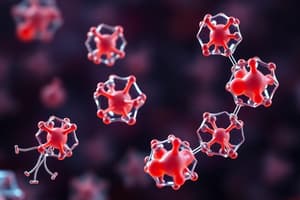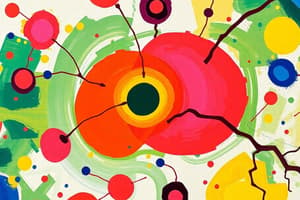Podcast
Questions and Answers
What is hyperammonemia characterized by?
What is hyperammonemia characterized by?
- Normal enzyme levels in the urea cycle.
- Low levels of nitrogen in the blood.
- High levels of ammonia in the blood. (correct)
- Decreased production of urea.
What often causes hyperammonemia?
What often causes hyperammonemia?
- Excessive ammonia production.
- High protein diet.
- Deficiencies in enzymes of the urea cycle. (correct)
- Increased urea synthesis.
Which enzyme generates N-Acetylglutamate?
Which enzyme generates N-Acetylglutamate?
- Argininosuccinate Synthetase.
- Ornithine Transcarbamylase.
- Carbamylphosphate Synthetase 1.
- N-Acetylglutamate Synthetase. (correct)
What is the role of N-Acetylglutamate in the urea cycle?
What is the role of N-Acetylglutamate in the urea cycle?
What are urea precursors?
What are urea precursors?
Which is the rate-limiting enzyme of the urea cycle?
Which is the rate-limiting enzyme of the urea cycle?
What is the first step in the urea cycle process?
What is the first step in the urea cycle process?
Which reaction uses the ammonium ion in the urea cycle?
Which reaction uses the ammonium ion in the urea cycle?
What is produced when Argininosuccinate is converted to Arginine?
What is produced when Argininosuccinate is converted to Arginine?
What is the final product of the urea cycle?
What is the final product of the urea cycle?
What role does Alpha Keto Glutarate play in hyperammonemia?
What role does Alpha Keto Glutarate play in hyperammonemia?
Where does the urea cycle primarily occur?
Where does the urea cycle primarily occur?
Which cellular compartment houses the first two urea cycle enzymes?
Which cellular compartment houses the first two urea cycle enzymes?
What is the function of Carbamylphosphate Synthetase 1 (CPS 1)?
What is the function of Carbamylphosphate Synthetase 1 (CPS 1)?
What is produced by the reaction of ornithine and carbamyl phosphate?
What is produced by the reaction of ornithine and carbamyl phosphate?
What role does N Acetylglutamate have in the urea cycle?
What role does N Acetylglutamate have in the urea cycle?
Why is the urea cycle critical for the body?
Why is the urea cycle critical for the body?
Where are the first two enzymes of the urea cycle located?
Where are the first two enzymes of the urea cycle located?
Which enzymes of the urea cycle reside in the cytosol?
Which enzymes of the urea cycle reside in the cytosol?
What does Carbonyl Phosphate Synthetase 1 (CPS 1) produce?
What does Carbonyl Phosphate Synthetase 1 (CPS 1) produce?
What is a key reactant for CPS 1 in the urea cycle?
What is a key reactant for CPS 1 in the urea cycle?
What reaction does Ornithine Transcarbamylase catalyze?
What reaction does Ornithine Transcarbamylase catalyze?
What is produced by Arginosuccinate Synthetase?
What is produced by Arginosuccinate Synthetase?
Arginosuccinate Lyase produces which compound?
Arginosuccinate Lyase produces which compound?
What compound does Arginase convert into urea?
What compound does Arginase convert into urea?
What condition results from disruptions in the urea cycle?
What condition results from disruptions in the urea cycle?
What does carbonyl phosphate contain at one end?
What does carbonyl phosphate contain at one end?
What is the significance of carbonyl phosphate in the urea cycle?
What is the significance of carbonyl phosphate in the urea cycle?
What is hyperammonemia?
What is hyperammonemia?
What does decreased carbamylphosphate indicate?
What does decreased carbamylphosphate indicate?
How is orotic acid level used in diagnosis?
How is orotic acid level used in diagnosis?
Which symptom indicates central edema?
Which symptom indicates central edema?
What condition can result from severe urea cycle disorders?
What condition can result from severe urea cycle disorders?
What characterizes OTC deficiency?
What characterizes OTC deficiency?
What symptom is associated with CPS 1 deficiency?
What symptom is associated with CPS 1 deficiency?
What can ammonium do regarding the blood-brain barrier?
What can ammonium do regarding the blood-brain barrier?
Orotic acid urea is linked to which urea cycle disorder?
Orotic acid urea is linked to which urea cycle disorder?
What clinical signs accompany lethargy in urea cycle disorders?
What clinical signs accompany lethargy in urea cycle disorders?
What molecule does Citrulline convert to in the Urea Cycle?
What molecule does Citrulline convert to in the Urea Cycle?
Which enzyme converts Argininosuccinate to Arginine?
Which enzyme converts Argininosuccinate to Arginine?
What are the end products of Arginine conversion in the Urea Cycle?
What are the end products of Arginine conversion in the Urea Cycle?
What is a primary diagnostic indicator of Hyperammonemia?
What is a primary diagnostic indicator of Hyperammonemia?
What happens to Blood Urea Nitrogen levels in Hyperammonemia?
What happens to Blood Urea Nitrogen levels in Hyperammonemia?
What is the significance of elevated blood glutamine in Hyperammonemia?
What is the significance of elevated blood glutamine in Hyperammonemia?
Which deficiency is characterized by elevated carbamylphosphate levels?
Which deficiency is characterized by elevated carbamylphosphate levels?
What additional compound is elevated in OTC deficiency?
What additional compound is elevated in OTC deficiency?
What condition can result from OTC deficiency?
What condition can result from OTC deficiency?
What is the diagnosis for OTC deficiency based on urine findings?
What is the diagnosis for OTC deficiency based on urine findings?
What specific details are missing for CPS 1 deficiency?
What specific details are missing for CPS 1 deficiency?
How toxic is the ammonium ion compared to ammonia?
How toxic is the ammonium ion compared to ammonia?
What is the physiological concentration of ammonium ion relative to ammonia?
What is the physiological concentration of ammonium ion relative to ammonia?
What is a critical implication of a complete block in the urea cycle?
What is a critical implication of a complete block in the urea cycle?
What condition arises from defects in the urea cycle?
What condition arises from defects in the urea cycle?
What symptom is associated with hyperammonemia?
What symptom is associated with hyperammonemia?
What kind of deficiencies may occur in hyperammonemia patients?
What kind of deficiencies may occur in hyperammonemia patients?
What is a common treatment approach for hyperammonemia?
What is a common treatment approach for hyperammonemia?
Which treatment may help mitigate ammonia accumulation?
Which treatment may help mitigate ammonia accumulation?
What is the primary benefit of urine's acidic nature?
What is the primary benefit of urine's acidic nature?
How does ammonia's toxicity compare to the ammonium ion?
How does ammonia's toxicity compare to the ammonium ion?
What is the main function of glutaminase?
What is the main function of glutaminase?
What is the significance of L and D amino acid oxidases?
What is the significance of L and D amino acid oxidases?
What is the primary purpose of the glucose-alanine cycle?
What is the primary purpose of the glucose-alanine cycle?
Where is catalase primarily found in the cell?
Where is catalase primarily found in the cell?
At what ammonia level do toxicity issues arise?
At what ammonia level do toxicity issues arise?
What is the toxic level of the ammonium ion?
What is the toxic level of the ammonium ion?
What effect does the higher concentration of ammonium ion have?
What effect does the higher concentration of ammonium ion have?
Why is a complete block in any step of the urea cycle critical?
Why is a complete block in any step of the urea cycle critical?
Study Notes
Hyperammonemia
- Characterized by high levels of ammonia in the blood.
- Often caused by deficiencies in enzymes of the urea cycle.
- Activated by the flow of nitrogen.
- N-Acetylglutamate Synthetase generates N-Acetylglutamate, which activates Carbonyl Phosphate Synthetase 1.
- Urea precursors are substances that provide nitrogen for the urea cycle.
- Carbamylphosphate Synthetase 1 is the rate-limiting enzyme of the urea cycle.
- The first step in the urea cycle is the formation of Carbamylphosphate.
- Ammonium ion + Bicarbonate forms Carbamylphosphate in the urea cycle.
- Argininosuccinate is converted to Arginine, producing Arginine.
- Urea is the final product of the urea cycle.
- Alpha Keto Glutarate forms glutamate, an intracellular nitrogen carrier, playing a role in hyperammonemia.
- The urea cycle primarily occurs in the liver.
Urea Cycle Enzymes and Locations
- The first two urea cycle enzymes, Carbamylphosphate Synthetase 1 (CPS 1) and Ornithine Transcarbamylase, are located in the mitochondrial matrix.
- The remaining three enzymes, Argininosuccinate Synthetase, Argininosuccinate Lyase, and Arginase, reside in the cytosol.
Urea Cycle Functions and Significance
- Carbamylphosphate Synthetase 1 (CPS 1) catalyzes the reaction forming carbonyl phosphate.
- Ornithine and carbamyl phosphate react to form citrulline.
- N Acetylglutamate facilitates the function of CPS 1.
- The urea cycle is critical for detoxifying ammonia and maintaining nitrogen balance.
Urea Cycle Regulation
- N-Acetylglutamate activates Carbonyl Phosphate Synthetase 1 (CPS 1), increasing the cycle's activity.
Urea Cycle Disorders and Symptoms
- Disruptions in the urea cycle result in hyperammonemia.
- Carbamylphosphate is an important urea cycle intermediate, and its decrease indicates a problem.
- Orotic acid level is a key diagnostic marker for urea cycle disorders.
- Central edema, swelling in the brain due to excess ammonia, is a symptom of urea cycle disorders.
- Severe urea cycle disorders can lead to coma.
- Elevated orotic acid levels can indicate Ornithine Transcarbamylase (OTC) deficiency.
- Decreased orotic acid levels are associated with CPS 1 deficiency.
- Ammonium can cross the blood-brain barrier, causing central edema.
- Orotic acid in the urine is linked to OTC deficiency.
- Lethargy, convulsions, and coma are clinical signs that accompany urea cycle disorders.
Specific Urea Cycle Deficiencies
- Ornithine Transcarbamylase (OTC) Deficiency is characterized by elevated carbamylphosphate and orotic acid levels.
- CPS 1 deficiency is characterized by decreased orotic acid levels.
Ammonia Toxicity and Hyperammonemia
- Hyperammonemia is characterized by elevated ammonia levels in the blood.
- Decreased carbamylphosphate indicates a reduction in an important urea cycle intermediate.
- Hyperammonemia patients have an intolerance to protein ingestion.
- Hyperammonemia can lead to mental and CNS deficiencies.
- A low protein diet is a common treatment approach for hyperammonemia.
- Alpha Keto Glutarate can help mitigate ammonia accumulation.
Physiological Roles of Ammonium and Ammonia
- The ammonium ion is less toxic than ammonia.
- The physiological concentration of ammonium ion is 100-fold higher than ammonia.
- A complete block in the urea cycle is incompatible with life.
- Defects in the urea cycle cause hyperammonemia.
Treatment for Hyperammonemia
- A low protein diet is a common treatment approach for hyperammonemia.
- Alpha Keto Glutarate can help mitigate ammonia accumulation.
Ammonia Metabolism and Detoxification
- Ammonia's toxicity is significantly higher than ammonium ion.
- Glutaminase removes nitrogen to generate glutamate and glutamine.
- L and D amino acid oxidases generate peroxide while breaking down D amino acids.
- The glucose-alanine cycle conserves glucose backbones for energy.
- Catalase is primarily found in peroxisomes.
Ammonia Toxicity Levels
- Toxicity issues arise at ammonia levels greater than 10 micrograms per liter.
- The toxic level of the ammonium ion is around half a milligram.
- A higher concentration of ammonium ion mitigates ammonia's toxicity.
- A complete block in any step of the urea cycle is incompatible with life.
Hyperammonemia
- Hyperammonemia is characterized by high levels of ammonia in the blood.
- Deficiencies in enzymes of the urea cycle often cause hyperammonemia.
- The urea cycle is activated by the flow of nitrogen.
### Urea Cycle
- N-Acetylglutamate Synthetase is the enzyme that generates N-Acetylglutamate.
- N-Acetylglutamate activates Carbonyl Phosphate Synthetase 1 in the urea cycle.
- Urea precursors are substances providing nitrogen for the urea cycle.
- The rate-limiting enzyme of the urea cycle is Carbamylphosphate Synthetase 1.
- The first step in the urea cycle process is the formation of Carbamylphosphate.
- The ammonium ion reacts with bicarbonate to form Carbamylphosphate.
- When Argininosuccinate is converted to Arginine, Citrulline is produced.
- The final product of the urea cycle is Urea.
- Alpha Keto Glutarate forms glutamate, which functions as an intracellular nitrogen carrier in hyperammonemia.
- The urea cycle primarily occurs in the liver.
- The first two urea cycle enzymes are located in the mitochondrial matrix.
Carbamylphosphate Synthetase 1 (CPS 1)
- CPS 1 catalyzes the reaction forming Carbamyl phosphate.
- The reaction of ornithine and carbamyl phosphate produces Citrulline.
- N Acetylglutamate facilitates the function of CPS 1.
### Urea Cycle Importance
- The urea cycle is critical because it detoxifies ammonia and maintains nitrogen balance.
### Urea Cycle Components
- The remaining three enzymes of the urea cycle reside in the cytosol.
- CPS 1 produces carbonyl phosphate.
- Bicarbonate is a key reactant for CPS 1.
### Urea Cycle Enzymes
- Ornithine Transcarbamylase catalyzes the reaction of ornithine and carbamyl phosphate to citrulline.
- Arginosuccinate Synthetase produces Argininosuccinate.
- Arginosuccinate Lyase produces Arginine.
- Arginase converts Arginine into urea.
### Hyperammonemia
- Hyperammonemia results from disruptions in the urea cycle.
- Carbonyl phosphate contains a phosphate group at one end.
- Carbonyl phosphate is an activated form of urea in the urea cycle.
- Hyperammonemia is characterized by elevated levels of ammonia in the blood.
- Decreased carbamylphosphate indicates a reduction in an important urea cycle intermediate.
- Orotic acid level is used as a key diagnostic marker for urea cycle disorders.
### Hyperammonemia Diagnosis & Treatment
- Central edema is indicated by swelling in the brain due to excess ammonia.
- Coma can result from severe urea cycle disorders.
- OTC deficiency is characterized by elevated levels of carbamylphosphate and orotic acid.
- CPS 1 deficiency is associated with decreased orotic acid levels.
- Ammonium can cross the blood-brain barrier, causing central edema.
- Orotic acid urea is linked to OTC deficiency.
- Lethargy in urea cycle disorders is accompanied by convulsions and coma.
### Urea Cycle Reactions
- Citrulline converts to Argininosuccinate.
- Argininosuccinate Lyase converts Argininosuccinate to Arginine.
- The end products of Arginine conversion are Urea and Ornithine.
Hyperammonemia Symptoms
- Elevated ammonia levels are a primary diagnostic indicator of Hyperammonemia.
- Blood Urea Nitrogen levels decrease in Hyperammonemia.
- Elevated blood glutamine in Hyperammonemia indicates ammonia overload.
### Urea Cycle Deficiencies
- OTC deficiency is characterized by elevated carbamylphosphate levels and orotic acid.
- Hyperammonemia can result from OTC deficiency.
- OTC deficiency is diagnosed based on orotic acid urea in urine findings.
### Ammonium Toxicity
- Ammonium ion is less toxic than ammonia with a toxicity level of 0.5 mg.
- The physiological concentration of ammonium ion is 100-fold higher than ammonia.
- A complete block in the urea cycle is incompatible with life.
### Hyperammonemia & Treatment
- Hyperammonemia arises from defects in the urea cycle.
- Hyperammonemia is associated with intolerance to protein ingestion and mental and CNS deficiencies.
- A low protein diet is a common treatment approach for hyperammonemia.
- Alpha Keto Glutarate may help mitigate ammonia accumulation.
- Urine's acidic nature traps ammonia as the ammonium ion.
- Ammonia is significantly more toxic than the ammonium ion.
### Ammonia Metabolism
- Glutaminase removes nitrogen to generate glutamate and glutamine.
- L and D amino acid oxidases generate peroxide while breaking down D amino acids.
- The glucose-alanine cycle conserves glucose backbones for energy.
- Catalase is primarily found in the peroxisomes.
Ammonia Toxicity Thresholds
- Toxicity issues arise at ammonia levels greater than 10 micrograms per liter.
- The toxic level of the ammonium ion is around half a milligram.
- The higher concentration of ammonium ion mitigates ammonia's toxicity.
- A complete block in any step of the urea cycle is incompatible with life.
Studying That Suits You
Use AI to generate personalized quizzes and flashcards to suit your learning preferences.
Related Documents
Description
Explore the key elements of hyperammonemia, characterized by elevated ammonia levels in the blood, and its connection to the urea cycle. This quiz covers the enzymes involved, their functions, and the metabolic processes that lead to urea production. Understand the importance of nitrogen flow and how deficiencies impact overall metabolism.



